1990 年 1 月英语六级真题及答案
Part I Listening Comprehension (20 minutes)
Section A
1.
A) Read four chapters.
B) Write an article.
C) Speak before the class.
D) Preview two chapters.
2.
A) The woman is being interviewed by a reporter.
B) The woman is asking for a promotion.
C) The woman is applying for a job.
D) The woman is being given an examination.
3.
A) His car was hit by another car.
B) He was hurt while playing volleyball.
C) He fell down the stairs.
D) While crossing the street, he was hit by a car.
4.
A) Took a photo of him.
B) Bought him a picture.
C) Held a birthday party.
D) Bought him a frame for his picture.
5.
A) No medicine could solve the woman’s problem.
B) The woman should eat less to lose some weight.
C) Nothing could help the woman if she ate too little.
D) The woman should choose the right foods.
6.
A) He meant she should make a phone call if anything went wrong.
B) He meant for her just to wait till help came.
C) He was afraid something would go wrong with her car.
D) He promised to give her himself.
7.
A) No, he missed it.
B) No, he didn’t.
�
C) Yes, he did.
D) Yes, he probably did.
8.
A) He has edited three books.
B) He has bought the wrong book.
C) He has lost half of his money.
D) He has found the book that will be used.
9.
A) At 7:30
B) At 8:30
C) At 9:00
D) At 9:30
10. A) Six.
B) Seven.
C) Eight.
D) Nine.
Section B
Passage One
Questions 11 to 13 are based on the passage you have just heard.
11. A) They often take place in her major industries.
B) British trade unions are more powerful.
C) There are more trade union members in Britain.
D) Britain loses more working days through strikes every year.
12. A) Such strikes are against the British law.
B) Such strikes are unpredictable.
C) Such strikes involve workers from different trades.
D) Such strikes occur frequently these days.
13. A) Trade unions in Britain are becoming more popular.
B) Most strikes in Britain are against the British law.
C) Unofficial strikes in Britain are easier to deal with now.
D) Employer-worker relations in Britain have become tenser.
Passage Two
�
Questions 14 to 16 are based on the passage you have just heard.
14. A) The victory over one’s fellow runners.
B) The victory over former winners.
C) The victory of will-power over fatigue.
D) The victory of one’s physical strength.
15. A) The runner who runs to keep fit.
B) The runner who breaks the record.
C) The runner who does not break the rules.
D) The runner who covers the whole distance.
16. A) He won the first prize.
B) He fell behind the other runners.
C) He died because of fatigue.
D) He gave up because he was tired.
Questions 17 to 20 are based on the passage you have just heard.
Passage Three
17. A) 17,000.
B) 1,700.
C) 24.
D) 9,000.
18. A) It’s located in a college town.
B) It’s composed of a group of old buildings.
C) Its classrooms are beautifully designed.
D) Its library is often crowed with students.
19. A) Teachers are well paid at Deep Springs.
B) Students are mainly from New York State.
C) The length of schooling is two years.
D) Teachers needn’t pay for their rent and meals.
20. A) Take a walk in the desert.
B) Go to a cinema.
C) Watch TV programmes.
�
D) Attend a party.
Part II Reading Comprehension (35 minutes)
Questions 21 to 24 are based on the following passage.
Automation refers to the introduction of electronic control and automatic operation
of productive machinery. It reduces the human factors, mental and physical, in
production, and is designed to make possible the manufacture of more goods with fewer
workers. The development of automation in American industry has been called the “Second
Industrial Revolution”.
Labour’s concern over automation arises from uncertainty about the effects on
employment, and fears of major changes in jobs. In the main, labour has taken the view
that resistance to technical change is unfruitful. Eventually, the result of automation
may well be an increase in employment, since it is expected that vast industries will
grow up around manufacturing, maintaining, and repairing automation equipment. The
interest of labour lies in bringing about the transition with a minimum of inconvenience
and distress to the workers involved. Also, union spokesmen emphasize that the benefit
of the increased production and lower costs made possible by automation should be shared
by workers in the form of higher wages, more leisure, and improved living standards.
To protect the interests of their members in the era of automation, unions have
adopted a number of new policies. One of these is the promotion of supplementary
unemployment benefit plans. It is emphasized that since the employer involved in such
a plan has a direct financial interest in preventing unemployment, he will have a strong
drive for planning new installations so as to cause the least possible problems in jobs
and job assignment. Some unions are working for dismissal pay agreements, requiring
that permanently dismissed workers be paid a sum of money based on length of service.
Another approach is the idea of the “improvement factor”, which calls for wage
increases based on increases in productivity. It is possible, however, that labour will
rely mainly on reduction in working time.
21. Though labour worries about the effect of automation, it does not doubt that
________.
A) automation will eventually prevent unemployment
B) automation will help workers acquire new skills
C) automation will eventually benefit the workers no less that the employers
D) automation is a trend which cannot be stopped
22. The idea of the “improvement factor” (Line 6, Para. 3) probably implies that
________.
A) wages should be paid on the basis of length of service
B) the benefit of increased production and lower costs should be shared by workers
C) supplementary unemployment benefit plans should be promoted
�
D) the transition to automation should be brought about with the minimum of
inconvenience and distress to workers
23. In order to get the full benefits of automation, labour will depend mostly on
________.
A) additional payment to the permanently dismissed workers
B) the increase of wages in proportion to the increase in productivity
C) shorter working hours and more leisure time
D) a strong drive for planning new installations
24. Which of the following can best sum up the passage?
A) Advantages and disadvantages of automation.
B) Labour and the effects of automation.
C) Unemployment benefit plans and automation.
D) Social benefits of automation.
Questions 25 to 30 are based on the following passage.
The case for college has been accepted without question for more than a generation.
All high school graduates ought to go, says conventional wisdom and statistical evidence,
because college will help them earn more money, become “better” people, and learn
to be more responsible citizens than those who don’t go.
But college has never been able to work its magic for everyone. And now that close
to half our high school graduates are attending, those who don’t fit the pattern are
becoming more numerous, and more obvious. College graduates are selling shoes and
driving taxis; college students interfere with each other’s experiments and write
false letters of recommendation in the intense competition for admission to graduate
school. Others find no stimulation in their studies, and drop out-often encouraged by
college administrators.
Some observers say the fault! Is with the young people themselves-they are spoiled
and they are expecting too much. But that’s a condemnation of the students as a whole,
and doesn’t explain all campus unhappiness. Others blame the state of the world, and
they are partly right. We’ve been told that young people have to go to college because
our economy can’t absorb an army of untrained eighteen-year-olds. But disappointed
graduates
trained
twenty-two-year-olds, either.
learning that
longer
it
can
absorb
are
no
an
army
of
Some adventuresome educators and campus watchers have openly begun to suggest that
college may not be the best, the proper, the only place for every young person after
the completion of high school. We may have been looking at all those surveys and
statistics upside down, it seems, and through the rosy glow of our own remembered college
experiences. Perhaps college doesn’t make people intelligent, ambitious, happy,
liberal, quick-learning people are merely the ones who have been attracted to college
in the first place. And perhaps all those successful college graduates would have been
�
successful whether they had gone to college or not. This is heresy(异端邪说) to those
of us who have been brought up to believe that if a little schooling is good, more has
to be much better. But contrary evidence is beginning to mount up.
25. According to the passage, the author believes that ________.
A) people used to question the value of college education
B) people used to have full confidence in higher education
C) all high school graduates went to college
D) very few high school graduates chose to go to college
26. In the 2nd paragraph, “those who don’t fit the pattern” refers to ________.
A) high school graduates who aren’t suitable for college education
B) college graduates who are selling shoes and driving taxis
C) college students who aren’t any better for their higher education
D) high school graduates who failed to be admitted to college
27. The drop-out rate of college students seems to go up because ________.
A) young people are disappointed with the conventional way of teaching at college
B) many young people are required to join the army
C) young people have little motivation in pursuing a higher education
D) young people don’t like the intense competition for admission to graduate
school
28. According to the passage the problems of college education partly arise from the
fact that ________.
A) society cannot provide enough jobs for properly trained college graduates
B) high school graduates do not fit the pattern of college education
C) too many students have to earn their own living
D) college administrators encourage students to drop out
29. In this passage the author argues that ________.
A) more and more evidence shows college education may not be the best thing for
high school graduates
B) college education is not enough if one wants to be successful
C) college education benefits only the intelligent, ambitious, and quick-learning
people
D) intelligent people may learn quicker if they don’t go to college
30. The “surveys and statistics” mentioned in the last paragraph might have shown
�
that ________.
A) college-educated people are more successful than non-college-educated people
B) college education was not the first choice of intelligent people
C) the less schooling a person has the better it is for him
D) most people have sweet memories of college life
Questions 31 to 35 are based on the following passage.
Ours has become a society of employees. A hundred years or so ago only one out of
every five Americans at work was employed, i.e., worked for somebody else. Today only
one out of five is not employed but working for himself. And when fifty years ago “being
employed” meant working as a factory labourer or as a farmhand, the employee of today
is increasingly a middle-class person with a substantial formal education, holding a
professional or management job requiring intellectual and technical skills. Indeed,
two things have characterized American society during these fifty years: middle-class
and upper-class employees have been the fastest-growing groups in our working
population-growing so fast that the industrial worker, that oldest child of the
Industrial Revolution, has been losing in numerical importance despite the expansion
of industrial production.
Yet you will find little if anything written on what it is to be an employee. You
can find a great deal of very dubious advice on how to get a job or how to get a promotion.
You can also find a good deal of work in a chosen field, whether it be the mechanist’s
trade or bookkeeping(簿记). Every one of these trades requires different skills, sets
different standards, and requires a different preparation. Yet they all have
employeeship in common. And increasingly, especially in the large business or in
government, employeeship is more important to success than the special professional
knowledge or skill. Certainly more people fail because they do not know the requirements
of being an employee than because they do not adequately possess the skills of their
trade; the higher you climb the ladder, the more you get into administrative or executive
work, the greater the emphasis on ability to work within the organization rather than
on technical abilities or professional knowledge.
31. It is implied that fifty years ago ________.
A) eighty per cent of American working people were employed in factories
B) twenty per cent of American intellectuals were employees
C) the percentage of intellectuals in the total work force was almost the same
as that of industrial workers
D) the percentage of intellectuals working as employees was not so large as that
of industrial workers
32. According to the passage, with the development of modern industry, ________.
A) factory labourers will overtake intellectual employees in number
B) there are as many middle-class employees as factory labourers
�
C) employers have attached great importance to factory labourers
D) the proportion of factory labourers in the total employee population has
decreased
33. The word “dubious” (L. 2, Para. 2) most probably means ________.
A) valuable
B) useful
C) doubtful
D) helpful
34. According to the writer, professional knowledge or skill is ________.
A) less importance than awareness of being a good employee
B) as important as the ability to deal with public relations
C) more important than employer-employee relations
D) more important as the ability to co-operate with others in the organization
35. From the passage it can be seen that employeeship helps one ________.
A) to be more successful in his career
B) to be more specialized in his field
C) to solve technical problems
D) to develop his professional skill
Questions 36 to 40 are based on the following passage.
We all know that the normal human daily cycle of activity is of some 7-8 hours’
sleep alternation with some 16-17 hours’ wakefulness and that, broadly speaking, the
sleep normally coincides with the hours of darkness. Our present concern is with how
easily and to what extent this cycle can be modified.
The question is no mere academic one. The ease, for example, with which people can
change from working in the day to working at night is a question of growing importance
in industry where automation calls for round-the-clock working of machines. It normally
takes from five days to one week for a person to adapt to reversed routine of sleep
and wakefulness, sleeping during the day and working at night. Unfortunately, it is
often the case in industry that shifts are changed every week; a person may work from
12 midnight to 8 a.m. one week, 8 a.m. to 4 p.m. the next, and 4 p.m. to 12 midnight
the third and so on. This means that no sooner has he got used to one routine than he
has to change to another, so that much of his time is spent neither working nor sleeping
very efficiently.
The only real solution appears to be to hand over the night shift to a number of
permanent night workers. An interesting study of the domestic life and health of
night-shift workers was carried out by Brown in 1957. She found a high incidence (发
生率) of disturbed sleep and other disorders among those on alternating day and night
�
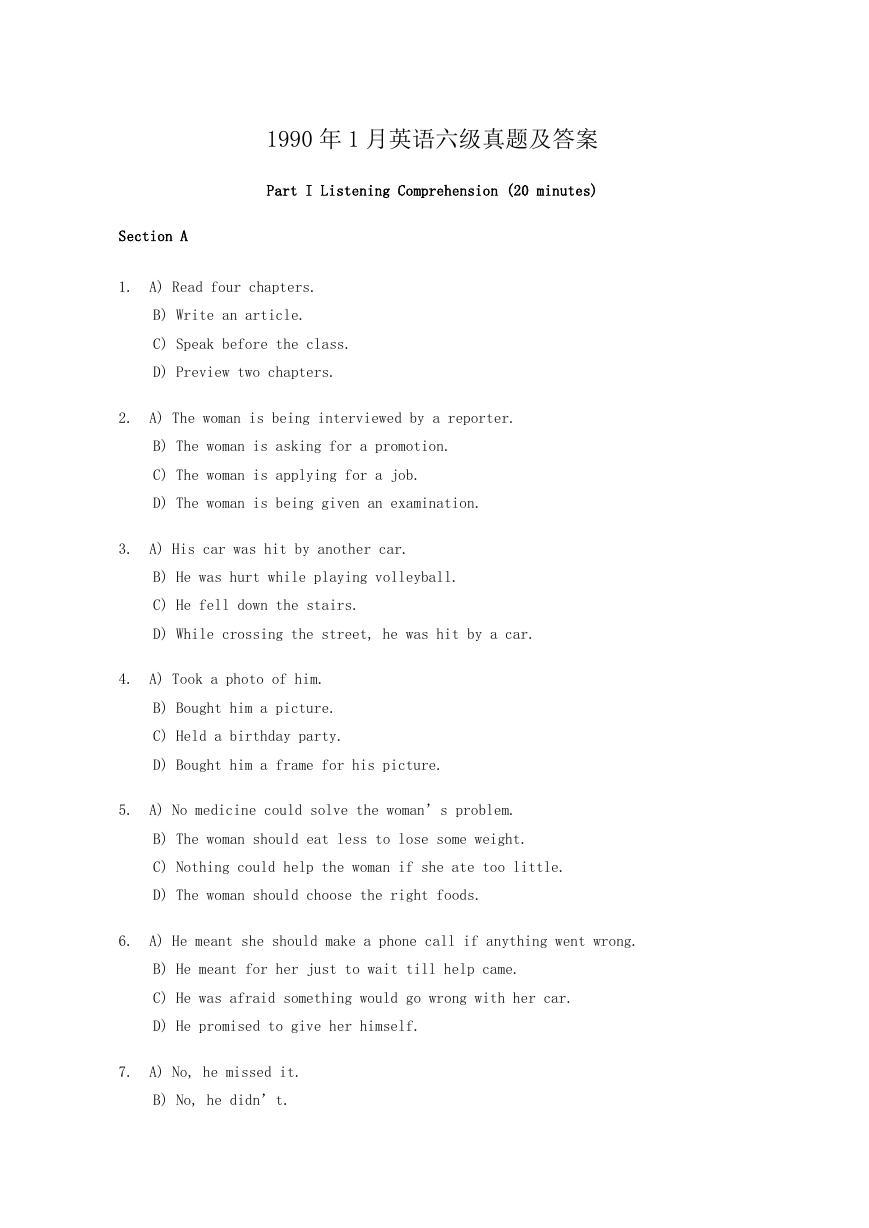
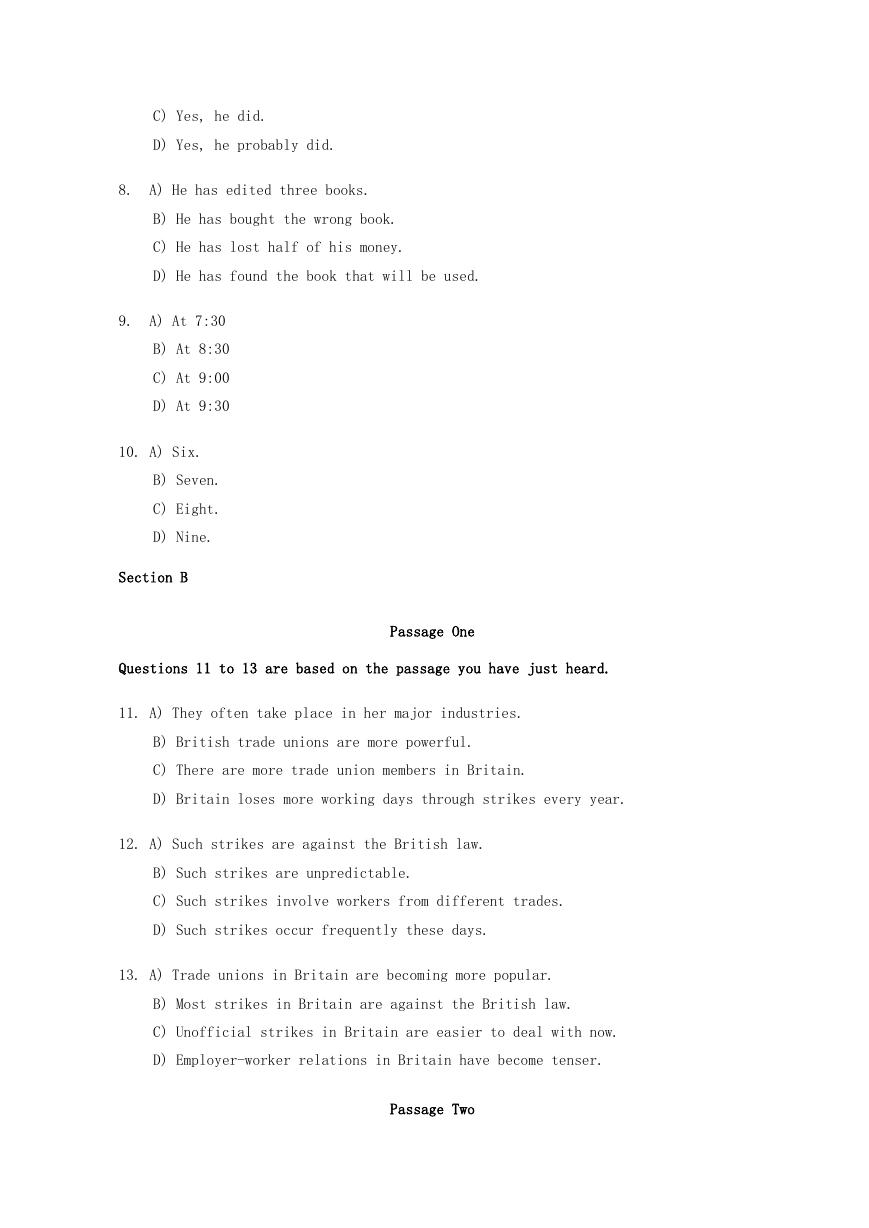
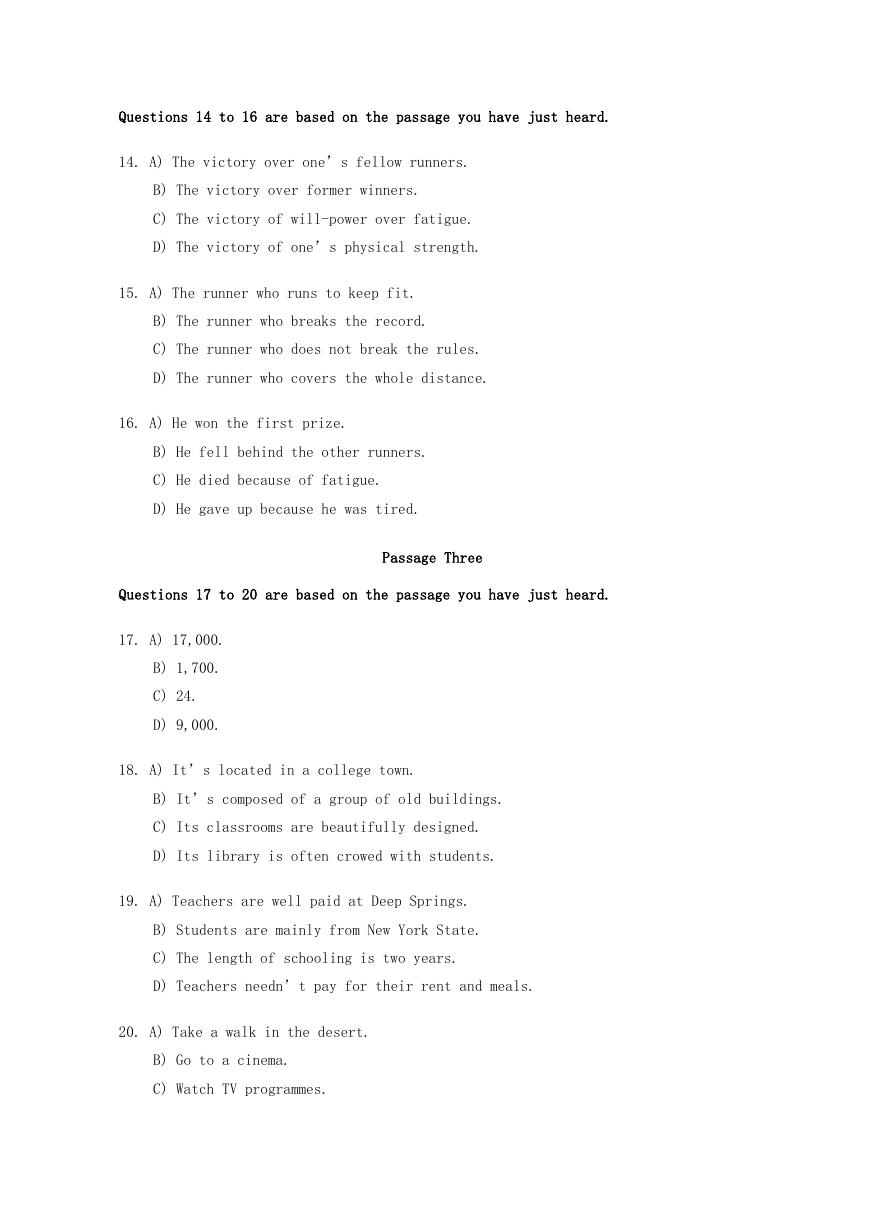
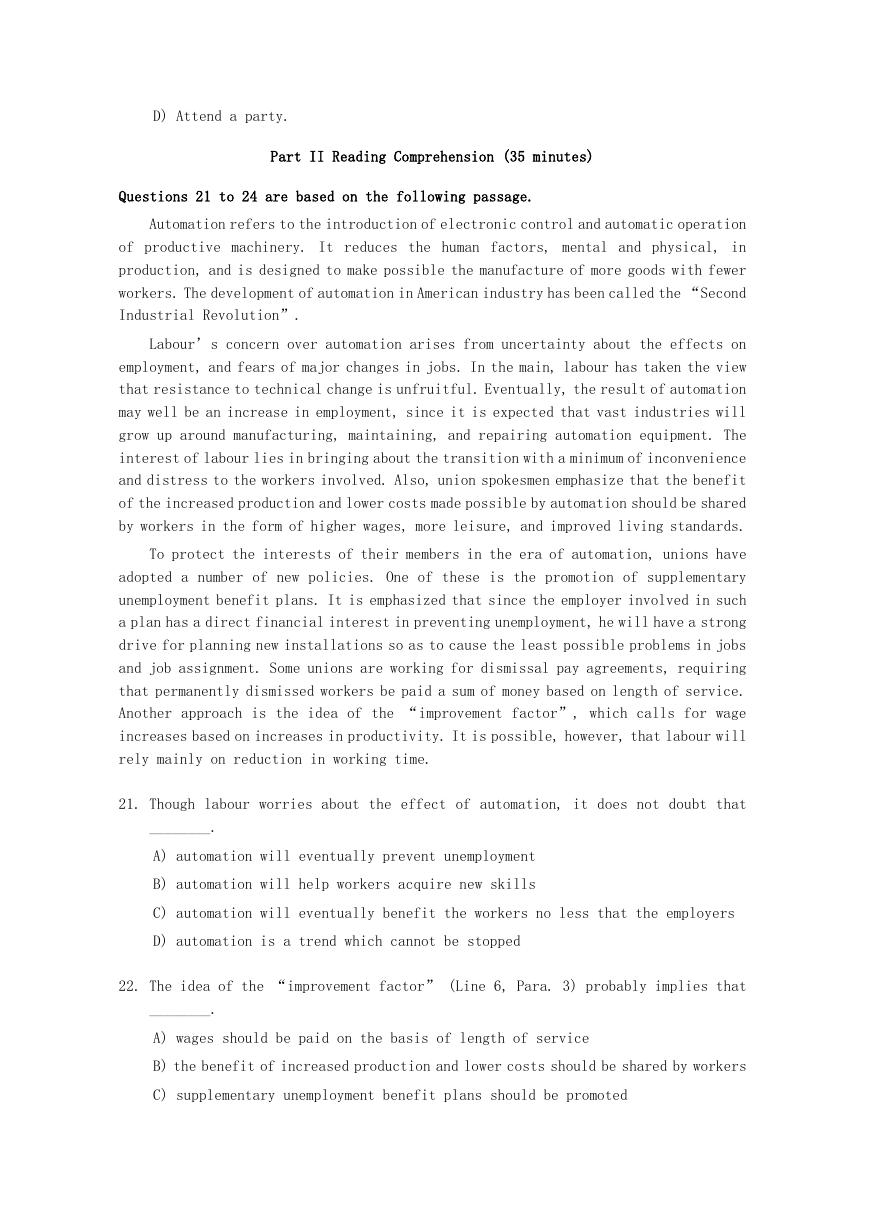
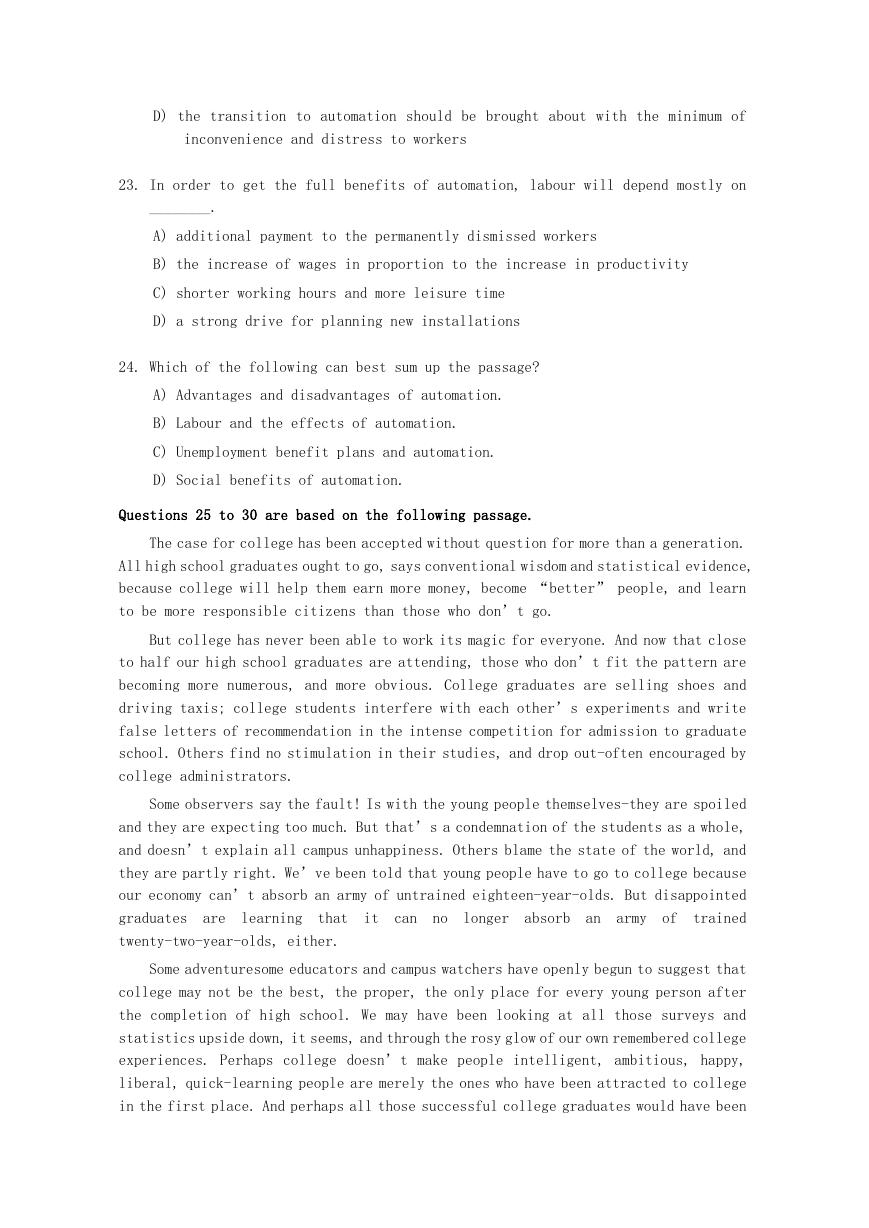
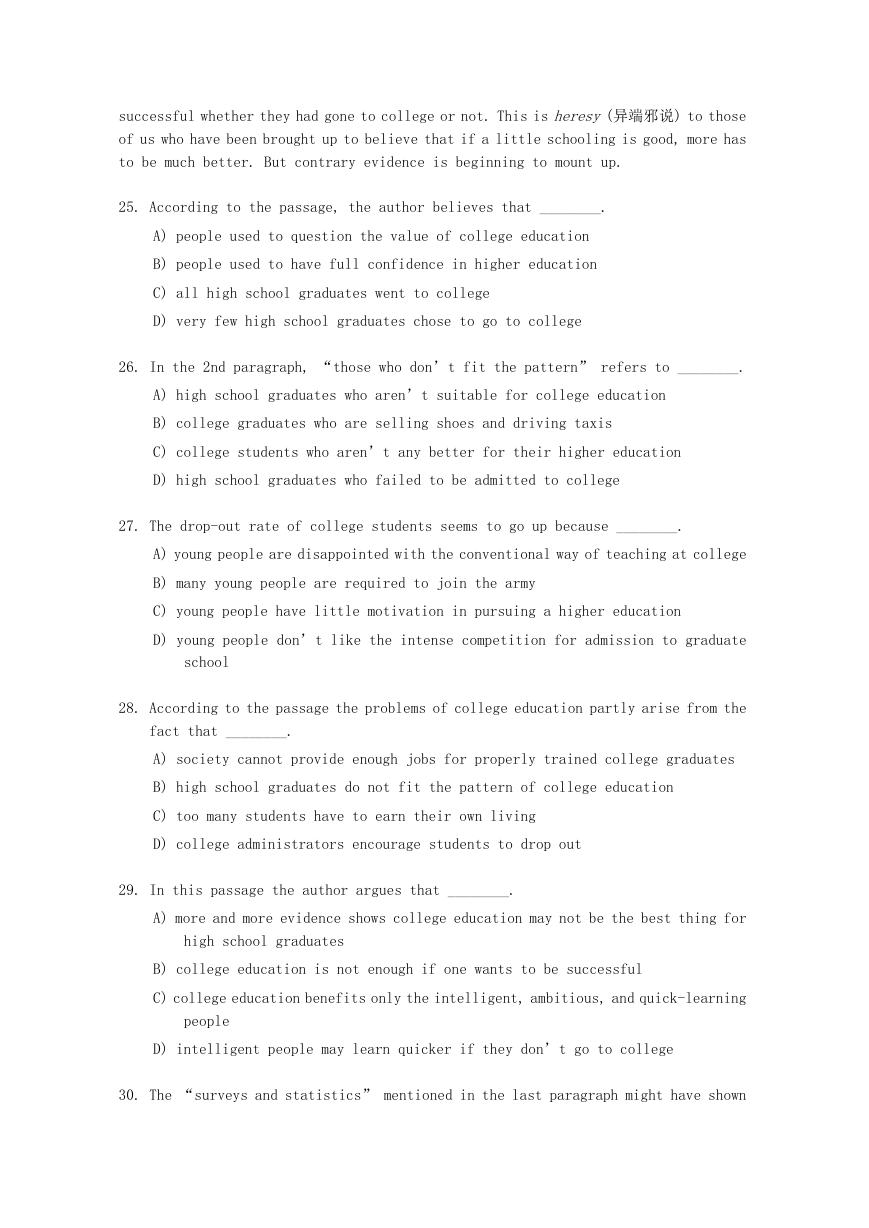
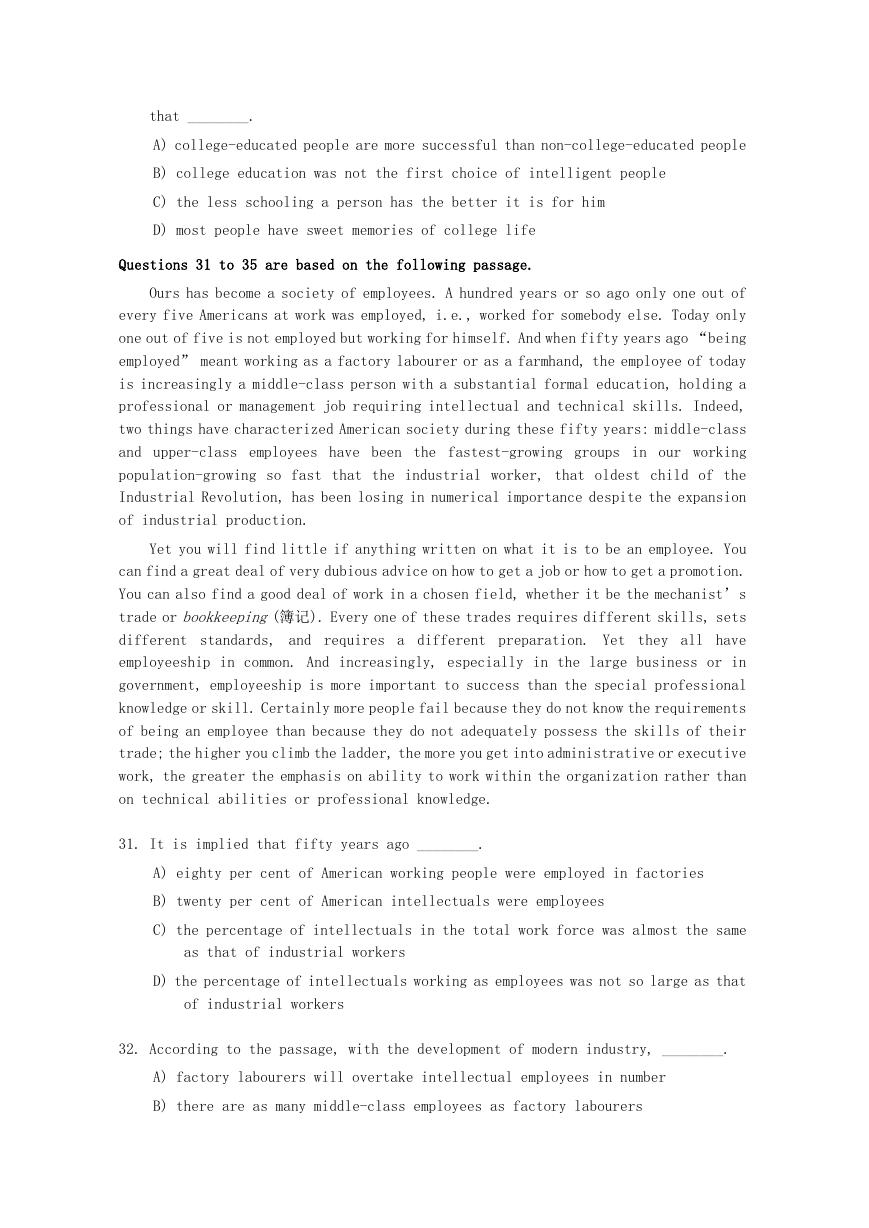
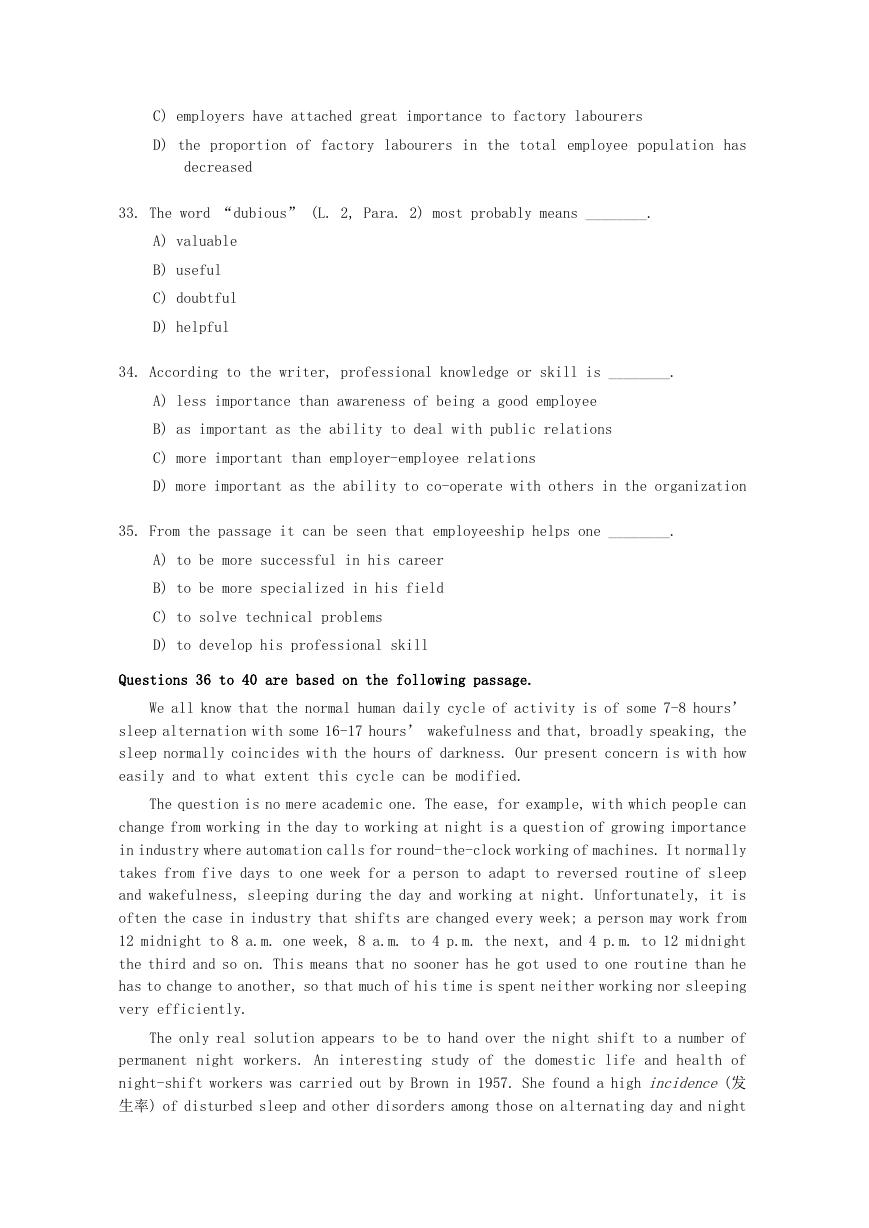








 2023年江西萍乡中考道德与法治真题及答案.doc
2023年江西萍乡中考道德与法治真题及答案.doc 2012年重庆南川中考生物真题及答案.doc
2012年重庆南川中考生物真题及答案.doc 2013年江西师范大学地理学综合及文艺理论基础考研真题.doc
2013年江西师范大学地理学综合及文艺理论基础考研真题.doc 2020年四川甘孜小升初语文真题及答案I卷.doc
2020年四川甘孜小升初语文真题及答案I卷.doc 2020年注册岩土工程师专业基础考试真题及答案.doc
2020年注册岩土工程师专业基础考试真题及答案.doc 2023-2024学年福建省厦门市九年级上学期数学月考试题及答案.doc
2023-2024学年福建省厦门市九年级上学期数学月考试题及答案.doc 2021-2022学年辽宁省沈阳市大东区九年级上学期语文期末试题及答案.doc
2021-2022学年辽宁省沈阳市大东区九年级上学期语文期末试题及答案.doc 2022-2023学年北京东城区初三第一学期物理期末试卷及答案.doc
2022-2023学年北京东城区初三第一学期物理期末试卷及答案.doc 2018上半年江西教师资格初中地理学科知识与教学能力真题及答案.doc
2018上半年江西教师资格初中地理学科知识与教学能力真题及答案.doc 2012年河北国家公务员申论考试真题及答案-省级.doc
2012年河北国家公务员申论考试真题及答案-省级.doc 2020-2021学年江苏省扬州市江都区邵樊片九年级上学期数学第一次质量检测试题及答案.doc
2020-2021学年江苏省扬州市江都区邵樊片九年级上学期数学第一次质量检测试题及答案.doc 2022下半年黑龙江教师资格证中学综合素质真题及答案.doc
2022下半年黑龙江教师资格证中学综合素质真题及答案.doc